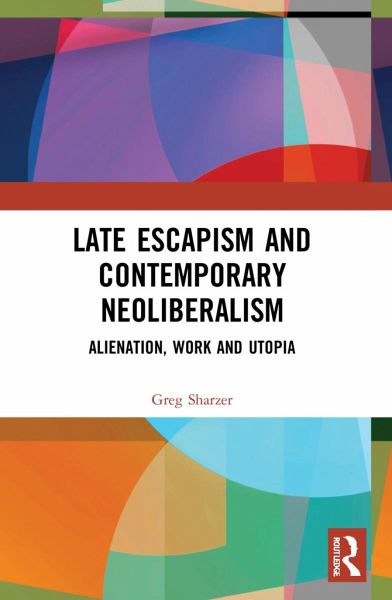
Late Escapism and Contemporary Neoliberalism
Alienation, Work and Utopia
Versandkostenfrei!
Versandfertig in 6-10 Tagen
45,99 €
inkl. MwSt.
Weitere Ausgaben:

PAYBACK Punkte
23 °P sammeln!
This book suggests that escapism - the desire to leave one's physical or emotional circumstances for an ideal alternative - is a way to understand the social conflicts that structure our world. Considering this phenomenon across psychology, labour and cultural studies, the author engages with critical theorists such as Lukács, Fromm and Marcuse to examine how escapism appears in our minds, workplaces and utopian imaginaries from fiction to music. In this study, escapism emerges as a constitutive feature of the late capitalist lifeworld - a feature that must be understood in order to create so...
This book suggests that escapism - the desire to leave one's physical or emotional circumstances for an ideal alternative - is a way to understand the social conflicts that structure our world. Considering this phenomenon across psychology, labour and cultural studies, the author engages with critical theorists such as Lukács, Fromm and Marcuse to examine how escapism appears in our minds, workplaces and utopian imaginaries from fiction to music. In this study, escapism emerges as a constitutive feature of the late capitalist lifeworld - a feature that must be understood in order to create social change.
Defining escapism as a new field of study, Late Escapism and Contemporary Neoliberalism: Alienation, Work and Utopia suggests that the phenomenon has much to teach us about contemporary consciousness and how we resist and reshape the edicts of neoliberalism. As such, this book will appeal to scholars of cultural and critical theory, social movements and political sociology.
Defining escapism as a new field of study, Late Escapism and Contemporary Neoliberalism: Alienation, Work and Utopia suggests that the phenomenon has much to teach us about contemporary consciousness and how we resist and reshape the edicts of neoliberalism. As such, this book will appeal to scholars of cultural and critical theory, social movements and political sociology.














